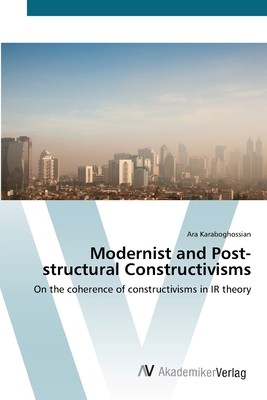
- We will send in 10–14 business days.
- Author: Ara Karaboghossian
- Publisher: AV Akademikerverlag
- ISBN-10: 3639421507
- ISBN-13: 9783639421507
- Format: 15.2 x 22.9 x 0.7 cm, softcover
- Language: English
- SAVE -10% with code: EXTRA
Reviews
Description
Revision with unchanged content. Realist/neo-realist and neo-liberal institutional approaches of international relations (IR) theory, which take a rationalist/systemic approach using the state as a primary unit of analysis, have come under fire. Due to this 'critical turn', the discipline of IR seems to have congealed around seemingly intractable conceptualizations of theorizing and research: structural vs. post-structural, and positivist vs. post-positivist. The first part of this book is concerned with assessing some constructivist critiques of the dominant theories. Since not all constructivists are classified or classify themselves as post-structuralist and/or post-positivist, the second part attempts to unpack the category of IR constructivism. By comparing and contrasting two diametrically opposed constructivist strands - modernist and post-structural - on the central constructivist themes of intersubjectivity, identity, and representation, the text attempts to verify whether a common core of principles exists between the opposing strands. The modernist work of Alexander Wendt (supplemented by Emanuel Adler and John Gerard Ruggie) is compared to the post-structural position of David Campbell (supplemented by Richard K. Ashley and R.B.J Walker). The result of the analysis demonstrates that, even within the diametrically opposed strands, a common core of constructivist principles does exist.
EXTRA 10 % discount with code: EXTRA
The promotion ends in 20d.15:34:03
The discount code is valid when purchasing from 10 €. Discounts do not stack.
- Author: Ara Karaboghossian
- Publisher: AV Akademikerverlag
- ISBN-10: 3639421507
- ISBN-13: 9783639421507
- Format: 15.2 x 22.9 x 0.7 cm, softcover
- Language: English English
Revision with unchanged content. Realist/neo-realist and neo-liberal institutional approaches of international relations (IR) theory, which take a rationalist/systemic approach using the state as a primary unit of analysis, have come under fire. Due to this 'critical turn', the discipline of IR seems to have congealed around seemingly intractable conceptualizations of theorizing and research: structural vs. post-structural, and positivist vs. post-positivist. The first part of this book is concerned with assessing some constructivist critiques of the dominant theories. Since not all constructivists are classified or classify themselves as post-structuralist and/or post-positivist, the second part attempts to unpack the category of IR constructivism. By comparing and contrasting two diametrically opposed constructivist strands - modernist and post-structural - on the central constructivist themes of intersubjectivity, identity, and representation, the text attempts to verify whether a common core of principles exists between the opposing strands. The modernist work of Alexander Wendt (supplemented by Emanuel Adler and John Gerard Ruggie) is compared to the post-structural position of David Campbell (supplemented by Richard K. Ashley and R.B.J Walker). The result of the analysis demonstrates that, even within the diametrically opposed strands, a common core of constructivist principles does exist.


Reviews